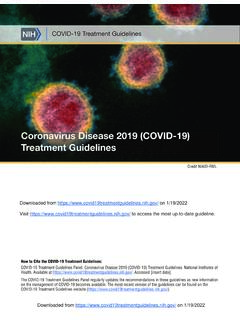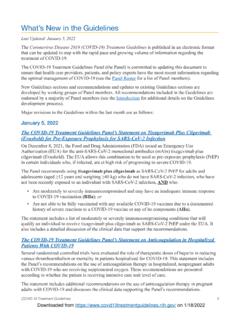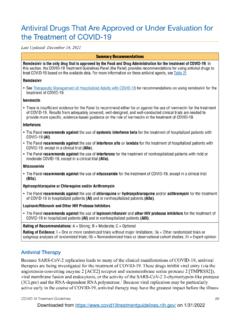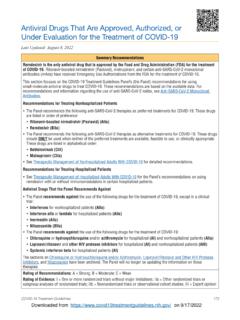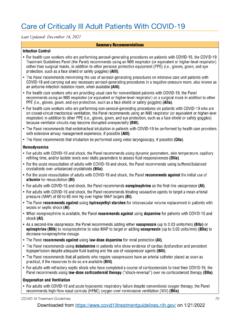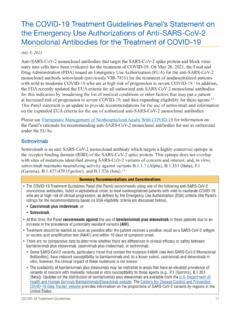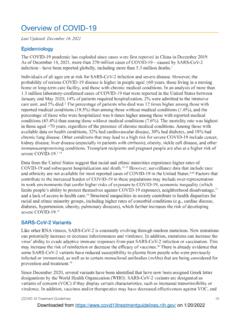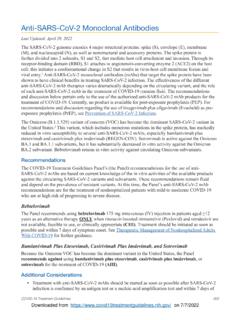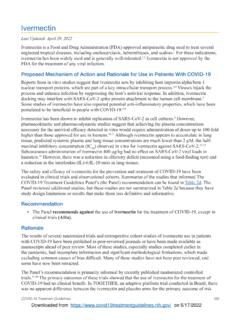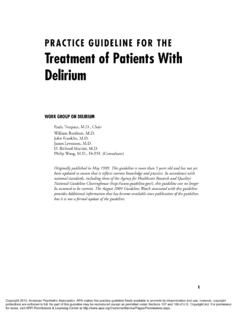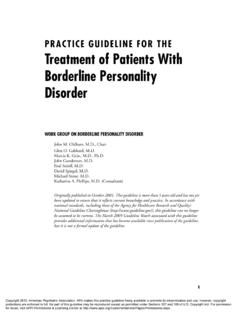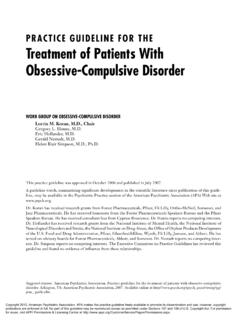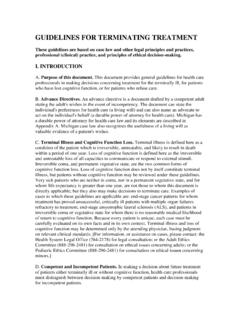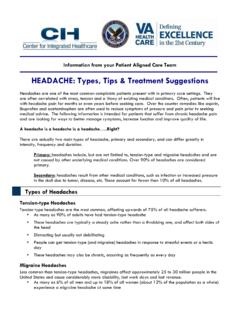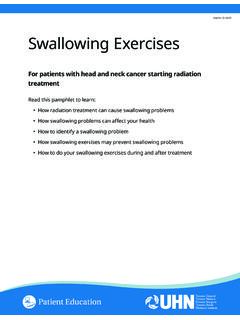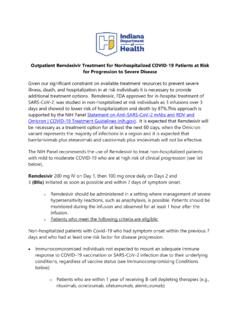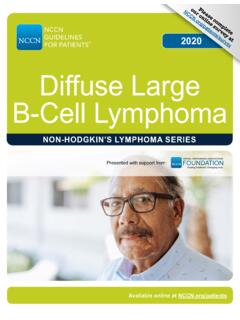Transcription of The National Institutes of Health COVID-19 Treatment ...
1 COVID-19 Treatment Guidelines 7 The National Institutes of Health COVID-19 Treatment Guidelines Panel Provides Recommendations for dexamethasone in patients with COVID-19 (Last updated June 25, 2020)IntroductionPatients with severe COVID-19 develop a systemic inflammatory response that can lead to lung injury and multisystem organ dysfunction. It has been proposed that the potent anti-inflammatory effects of corticosteroids might prevent or mitigate these harmful effects. Small, retrospective cohort studies and case series have yielded conflicting results; both beneficial1-4 and harmful5,6 effects have been reported in studies that have evaluated short courses of corticosteroids in patients with COVID-19 .
2 A preliminary, unpublished analysis from a large, multicenter, randomized, open-label trial for hospitalized patients in the United Kingdom showed that patients who were randomized to receive dexamethasone had a reduced rate of mortality compared to those who received standard of This benefit was observed in patients with severe COVID-19 (defined as those who required supplemental oxygen) and was greatest in those who required mechanical ventilation at enrollment. No benefit of dexamethasone was observed in patients who did not require supplemental oxygen at enrollment.
3 Based on these preliminary results: The COVID-19 Treatment Guidelines Panel (the Panel) recommends using dexamethasone (at a dose of 6 mg per day for up to 10 days) in patients with COVID-19 who are mechanically ventilated (AI) and in patients with COVID-19 who require supplemental oxygen but who are not mechanically ventilated (BI). The Panel recommends against using dexamethasone in patients with COVID-19 who do not require supplemental oxygen (AI).Clinicians should refer to the Additional Considerations section below for further guidance before prescribing dexamethasone for a patient with Trial Data That Supports the Panel s RecommendationThe Randomised Evaluation of COVID-19 Therapy (RECOVERY) study is a multicenter, open-label trial sponsored by the National Health Service in the United Kingdom.
4 Hospitalized patients with clinically suspected or laboratory-confirmed COVID-19 were randomized to receive one of several potential treatments for COVID-19 plus standard of care or standard of care alone. In one of the study arms, dexamethasone 6 mg daily was administered either orally or intravenously for 10 days (or until hospital discharge, whichever came first). Recruitment was stopped by the steering committee of the study on June 8, 2020, when a sufficient number of participants were enrolled to assess benefit. A preliminary analysis was performed on 6,425 participants, with 2,104 participants in the dexamethasone arm and 4,321 in the control arm.
5 The mean age of the study population was years, 64% of participants were male, and 56% had at least one major comorbidity. At enrollment, 16% of the participants required invasive mechanical ventilation, 60% had received supplemental oxygen but no invasive ventilation, and 24% required no oxygen supplementation. Very few participants who were included in this analysis received hydroxychloroquine, lopinavir/ritonavir, remdesivir, or tocilizumab; approximately 7% of participants in the standard of care arm received dexamethasone after randomization.
6 COVID-19 Treatment Guidelines 8 Results have been released for the primary endpoint of 28-day Overall, of participants in the dexamethasone arm and of those in the control arm died within 28 days of study enrollment (age-adjusted rate ratio [RR] ; 95% confidence interval [CI], , P < ). There was evidence of a significant interaction between baseline severity of COVID-19 and the effect of dexamethasone . The survival benefit was greatest among dexamethasone -treated participants who required invasive mechanical ventilation at randomization: of these participants died within 28 days of study enrollment compared with in the control arm (RR ; 95% CI, , P < ).
7 Additionally, of dexamethasone -treated patients who required supplemental oxygen at enrollment died within 28 days of enrollment compared with in the control arm (RR ; 95% CI, , P = ). However, no survival benefit was observed among the participants who did not require oxygen therapy at enrollment (RR ; 95% CI, , P = ).8 It should be noted that the age distribution of participants differed by respiratory support status at the time of randomization. The participants who received mechanical ventilation were more likely to be aged <70 years.
8 Among the participants who were aged >80 years, only 1% were mechanically ventilated, while 62% and 37% were in the oxygen group and no oxygen group, respectively. Therefore, the survival benefit of dexamethasone for mechanically ventilated patients aged >80 years is unknown. Full analysis of this study is ongoing. At this time, the results of other key study endpoints, the potential adverse events, and the efficacy of dexamethasone in key subgroups ( , age groups, patients with comorbidities, pregnant patients , children) are not yet known.
9 In addition, the individuals with COVID-19 who required oxygen but not mechanical ventilation were a heterogeneous group, and it is unclear whether dexamethasone will be more or less beneficial for other subsets of patients ( , those who require high levels of supplemental oxygen).Additional Considerations The results of the RECOVERY trial have not yet been published in a peer-reviewed journal. Remdesivir was not part of the Treatment in the RECOVERY trial; therefore, the safety and efficacy of coadministering remdesivir and dexamethasone are not known.
10 Very few pediatric or pregnant patients with COVID-19 were included in the RECOVERY trial; therefore, the safety and efficacy of using dexamethasone in these patients are unknown. It should be noted that in the RECOVERY trial, patients were not enrolled into the dexamethasone study arm (or included in the analysis) if their physicians decided that they were not suitable for corticosteroid therapy for any reason. Before initiating dexamethasone , clinicians should review the patient s medical history and assess the potential risks and benefits of administering corticosteroids to the patient.

